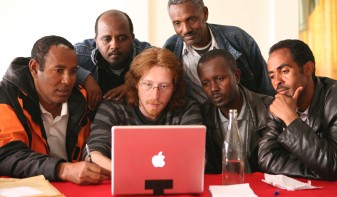
Writing a Brief
We’re on the receiving end of a lot of briefs; some good, some bad, some downright ugly. Ultimately a brief opens the door to a working relationship; a really good one let’s us know what you want and gives us the opportunity to show you what we can do. Based on our experience, here are some questions to have in mind as you develop a brief.
What is the purpose?
Why make the programme? What is that you want to communicate and what is the intended outcome? Is it to launch a product, explain an idea, promote a service, demonstrate a skill, explore an idea, start a conversation, or support a specific campaign? Is it an attempt at solving a particular problem? What are the key messages, ideas or emotions that you want to come across? What do you want the audience to think, feel or understand?
Who do you want to see it and how will they see it?
Who will your audience be? What do they know about you already? Where, how and when do expect people to watch it; at a conference, in a group, online – via a specific site of channel – at their desks, on their phone, on TV – or all of these?
What do you want it to include?
It helps if you have some ideas about what content you want to include, in terms of contributors, interviewees and key locations. It’s also useful outline any material that might be available, in terms of archive footage, existing stills and video, or branding, fonts and colours.
How would you like it to be narrated?
Do you have a preference about how the story will be told? Do you want voice over? Text titles? Talking heads? Animation of Motion Graphics? It is good to have an idea about this before you start because each option will have a strong influence on the approach, style, timescale and costs.
What style would you like it to have?
Do you want the video to be like a documentary? Would you like lots of talking heads? Maybe you want to create something impressively cinematic, boldly graphic, or quirky and comic. If you can draw on examples that use styles that you are aspiring to, it would be really useful to share them.
What is your budget?
Have an idea of how much you want to spend. We need to know what they are working with and you need to know your limits.
What are your deadline and deliverables?
Specify a deadline at the beginning of the process and think a little about how closely you want to be involved in the process and how much time you’d like to devote to it. Also, how do you want to take delivery of the final product? Should the video be mastered for online, Youtube, TV, installation or streaming? Does it need to be captioned, subtitled or translated?
Continue the Conversation…
Last, but by no means least, don’t forget that the brief is just a beginning.
- Don’t be too rigid – Allow the ideas to grow; leave some some space for creativity.
- Be realistic – The ideas need to reflect the budget and timescale.
- Communicate – Communicate clearly and simply when writing a brief.
The communication doesn’t end there – keep in touch throughout the process. Let’s explore the possibilities together.
Releated content:

